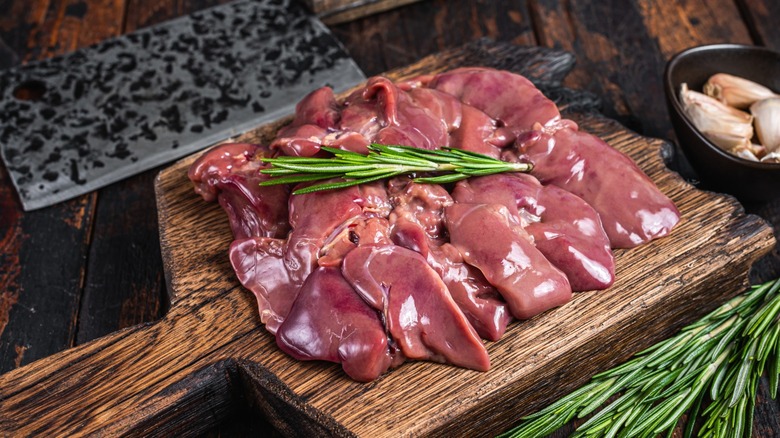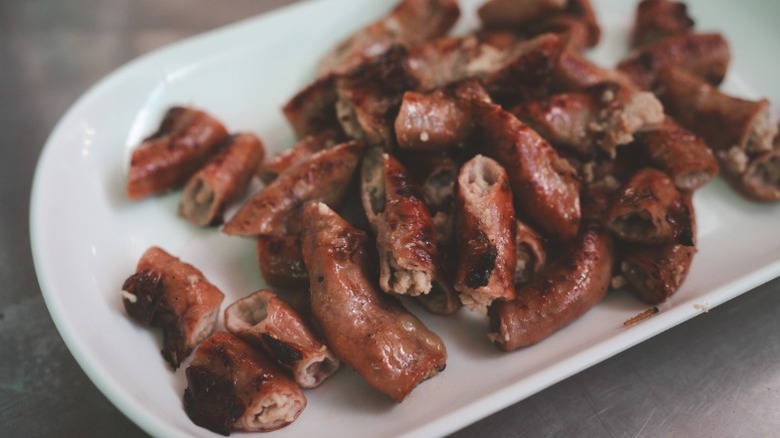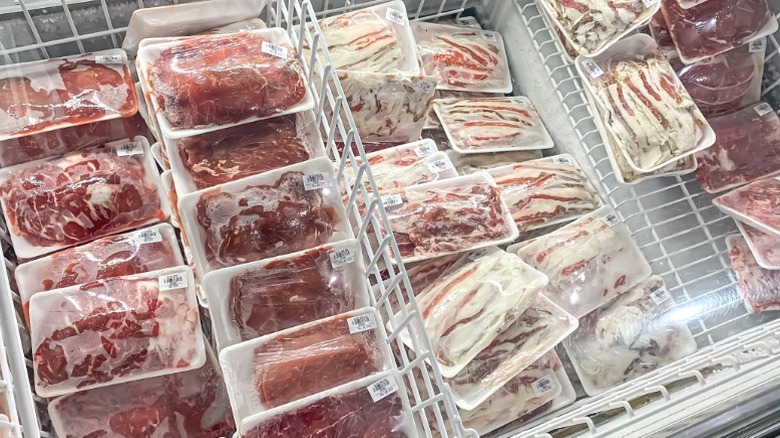When Did Offal Become Awful To Americans?
Culture shock can be a funny thing. For instance, Americans can often be quite squeamish about foreign cuisine, shuddering at the sight of French escargot (or snails) or turning green from the mere mention of Scottish haggis. But to other countries, it's the Americans who have grotesque eating habits. Anthony Bourdain once remarked that, of all the esoteric foreign dishes he had eaten, nothing was as gross to him as Cinnabon. Nowhere is this disparity more apparent than when it comes to offal. Many other countries have no problem eating animal organs: Black pudding, or sausage made with pig's blood, is popular in the United Kingdom, while lampredotto, made from a cow's fourth stomach, is a regional delicacy in Italy. But give or take a bit of liverwurst or the occasional deep-fried bull testicle, Americans by and large reject offal. Why is that? There are a few different reasons, some of which are more straightforward than others.
First of all, Americans are, in general, somewhat spoiled when it comes to food. America is a very large, very wealthy nation — there are individual cattle ranches in Texas bigger than some European countries — which means we can produce and consume as much meat as we please. And because agriculture is subsidized so heavily by the government, that meat is not only plentiful, but relatively cheap. When you can buy a quality cut of roast beef for ten dollars, you probably don't feel the need to eat tongue.
Race and class play into American distaste for offal
Of course, there were plenty of Americans throughout history who did, in fact, need to eat offal. In the antebellum era, when a pig was butchered, the white, slave-owning family would take the choicest cuts for themselves and leave the slaves to eat the entrails. (Chitlins, or fried pig intestines, remain a Southern delicacy to this day; the "chitlin circuit," or the Black-owned entertainment venues where legends like B.B. King and James Brown plied their trade pre-integration, got its name from the dish.) Because offal was eaten by the rural poor — specifically the Black rural poor — a stigma developed, one that was only sporadically broken.
At a certain point, this aversion to offal became a self-fulfilling prophecy: if you've never eaten offal, you don't know how to make it, and if you don't know how to make it, you don't eat it. A government task force led by the anthropologist Margaret Mead attempted to overcome this during World War II, when the choice cuts of meat were being sent overseas to our troops. A campaign encouraging people to use "variety meats" began in 1943, touting their nutritional benefits and disseminating recipes through "Life" Magazine. The campaign actually enjoyed some success, at least until the war ended two years later and Americans went right back to buying steaks and lamb chops. You can lead a horse to beef tripe, but you can't make them eat.
The offal cost of America's aversion to entrails
But if Americans aren't eating offal, then what exactly are they doing with it? There is no special breed of pig that comes without intestines, and all those entrails have to go somewhere. Well, too often, we just end up throwing it away. Even in the best-case scenario, that would be a shame, as tons of perfectly edible meat would be festering in landfills. (Up to 40% of a cow's weight at the time of slaughter comes from offal.) But as it happens, decomposing offal emits greenhouse gases — and we already get enough of those from live cattle, thank you very much.
So what else do we do with offal? A lot of it is sent overseas to other countries that have more of a taste for the stuff than we do. Some of our prime exporting targets for offal include Egypt, Japan, and Mexico. But believe it or not, we do end up eating some offal, at least in sausage form. Ground-up bits of organ meat will end up in your sausage and hot dogs, with plenty left over for Fido's dog food. So if you're squeamish about eating offal, don't worry: you've probably already had some, and it hasn't caused you any trouble.


